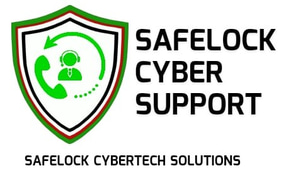SAFELOCK CYBER SUPPORT
Hacked Virtual Currency Account
Use this guide when someone has accessed your virtual currency wallet online without your permission.
Cryptocurrencies are a prime target for cybercriminals. Whether your wallet has been hacked or an exchange compromised, swift action is essential. If your funds were stolen through a scam rather than hacking, check our Virtual Currency Scams Guide for detailed assistance.
We want to better understand the impact of you experiencing this issue, can you share your experience by filling in this online form? This will help us better protect future victims.
Hacked virtual currency account - Do this now!
Immediate Actions to Take
1. Report the Incident
Contact the Police: File a report with your local cybercrime cell or the police. In India, you can report cybercrimes on the National Cyber Crime Reporting Portal. Ensure you receive a formal complaint or reference number for further proceedings.
2. Secure Your Account
Change Login Credentials: If you still have access, reset your password and enable two-factor authentication (2FA) to block unauthorized access. Learn more about secure passwords from Cyber Aware.
Notify Your Service Provider: Inform the exchange or wallet provider about the breach. They might assist with details or actions related to the fraudulent transactions.
Likelihood of Recovery
Recovering stolen virtual currency is challenging:
Tracking Funds: Blockchain monitoring tools like BlockCypher can trace transactions, but identifying the perpetrator remains difficult due to anonymity.
Decentralized Nature: With no central authority, the recovery process is limited.
Exchanges' Role: If the thief trades the currency for fiat money on an exchange, they might have submitted identification (KYC). This can aid investigations when reported promptly.
Steps to Address Stolen Cryptocurrency
1. Scan for Malware
A device compromise might have led to the theft. use any Malware Removal to scan and secure all devices used for cryptocurrency activities.
2. Alert Your Bank
If related fees or deposits reflect in your bank account, report these as unauthorized transactions to your bank. Learn more about safeguarding your bank accounts on RBI’s Cyber Safety Tips.
3. Trace the Money Trail
Use blockchain explorers like BlockCypher to track the destination of your funds.
Check whether the destination wallet’s owner appears on Bitcoin Whos Who.
Inform exchanges if the thief transfers funds to their platforms. Review a list of Indian exchanges like CoinSwitch or WazirX for their contact details.
4. Consider Hiring Experts
Services like Safelock Cyber Tech Solutions Pvt Ltd provide investigative support .
Preventive Measures for Future Protection
1. Enhance Anonymity
Avoid public discussions about owning cryptocurrency. Learn more on staying anonymous at Get Safe Online.
2. Use Advanced Security
Enable multi-factor authentication (preferably app-based). Use apps like Google Authenticator or Authy.
Use a new, complex email address exclusively for cryptocurrency accounts. Check password security using Have I Been Pwned?.
3. Opt for Offline Storage
Store your assets in a "cold wallet" to reduce online exposure. Learn more about cold wallets on Investopedia.
4. Diversify Investments
Spread holdings across multiple exchanges to minimize risks from breaches.
5. Strengthen Overall Security
Educate yourself using platforms like Cyber Aware and Get Safe Online. Implement robust security measures for all online activities.
Will I get my money back?
Once your virtual currency has been stolen it is incredibly unlikely that you will be able to recover it. In theory, it’s possible to track your stolen bitcoin by monitoring the blockchain – in practice, however, this is made difficult by both the anonymous nature of the currency and the fact that the thief will most likely use a bitcoin exchange to trade the currency for normal cash straight away. However, money does leave a trail and you may be able to follow it to the identity of the criminal. Even if you successfully use public ledgers to trace the currency, since most cryptocurrency is decentralized there aren't many routes you can follow to get it back.
Approaches to dealing with stolen virtual currency
Check your devices for malware - It is worth considering that a malicious software infection may have led to the hacker accessing your currency. Scan the devices you use to handle your currency and make sure they are clean. You can follow our guide on checking for and removing malware here.
Call your bank - If the transaction had related costs that hit your bank account - such as transaction fees or deposits - then contact your bank immediately and let them know it is an unauthorized/fraudulent transaction.
Follow the money - You can follow the transactions of the wallet address that your funds were scammed into. If you notice the scammer attempting to transfer funds from the wallet to cryptocurrency exchanges to sell for flat currency, report to the relevant exchanges immediately. An opportunity to catch the scammer is to follow the money trail through blockchain explorers and trace your lost funds. You can use browser-based blockchain exploring software such as https://www.blockcypher.com/ to ‘follow’ the payment through to an end bitcoin address. Once you have this address you can check whether the owners of the end address(es) appear on http://bitcoinwhoswho.com/. In order to trade crypto to regular money on most popular exchanges, the thief would need to submit KYC (Know Your Customer) information, such as names, addresses, and ID information. Contacting the exchanges can potentially help you to track down the scammer’s identity, which can help to lead to his/her arrest. This is another reason why it is important for you to file a police report as soon as the incident has taken place.
How do I avoid my virtual currency being stolen in future?
Don’t talk publicly about owning virtual currency - If it is easy to work out that you own a cryptocurrency from your social media activity then you are much more likely to be a target.
Use multi-factor authentication - Ensure that you have multi-factor authentication enabled. Use an authenticator app rather than the SMS option. If the option to disable SMS authentication exists then do it.
Use a new email address and complex password to set up the account - A new, clean email address that you will only use for the virtual currency account is best. This reduces the chance of you being targeted via your email account.
Use a ‘cold-wallet’ - Keep your cryptocurrency off the internet, in a "cold wallet." "Cold wallet" is not a brand, it's a concept of storing bitcoins offline (not connected to internet) so that it reduces the opportunities for hackers to steal via online techniques.
Spread your investments across exchanges - A number of exchanges have been breached. Spread your investments across exchanges to minimize the impact.
Get secure - Take time to improve your general online security. Use sites like Get Safe Online and Cyber Aware to understand what good security looks like and make changes.
Relevant Indian Laws
Under the Information Technology Act, 2000, hacking and unauthorized access to computer systems are punishable offenses. Key sections include:
Section 66: Punishment for computer-related offenses, including hacking and data theft.
Section 66C: Punishment for identity theft.
Section 66D: Punishment for cheating by personation using computer resources.
If funds were stolen through fraud, it may also fall under:
Section 420 of the Indian Penal Code (IPC): Cheating and dishonestly inducing delivery of property.
For more information visit - safelocktech.com
Our architecture services take into consideration your lifestyle and preferences to create spaces that are both beautiful and functional.


